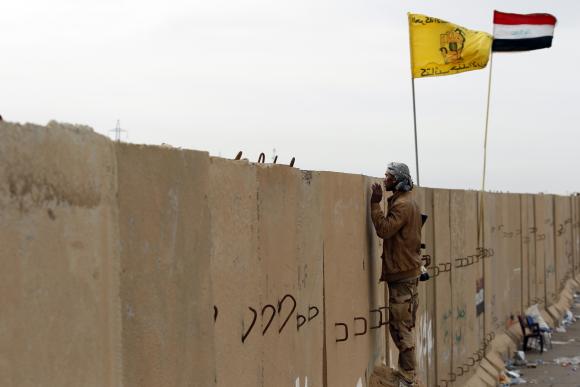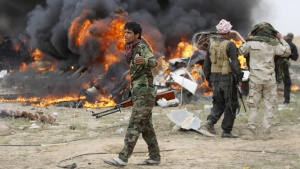www.aljazeerah.info
News, March 2015
Archives
Mission & Name
Conflict Terminology
Editorials
Gaza Holocaust
Gulf War
Isdood
Islam
News
News Photos
Opinion Editorials
US Foreign Policy (Dr. El-Najjar's Articles)
www.aljazeerah.info
|
Editorial Note: The following news reports are summaries from original sources. They may also include corrections of Arabic names and political terminology. Comments are in parentheses. |
50 Iraqi Soldiers Killed in US-Led Airstrike, Government Offensive Against Islamic State in Tikrit Stalled
March 13, 2015
 |
 |
| A shi'ite fighter known as Hashid Shaabi keeps watch on the frontline, on the southern edge of Tikrit March 12, 2015. | Explosion in Al-Anbar |
US-Led Coalition launches 13 air strikes on areas controlled by the Islamic State, five of which near Tikrit, the others were in areas in Fallouja, Al-Qaem, west of Ramadi, and west of Mosul.
|
http://www.yaqen.net/news.php?action=view&id=30639
Iraqi offensive to dislodge Islamic State from Tikrit appears to stall
By saif Hameed
BAGHDAD Fri Mar 13, 2015 8:39am EDT
BAGHDAD (Reuters) -
The offensive to retake Tikrit appeared to stall on Friday, two days after Iraqi security forces and mainly Shi'ite militia pushed into Saddam Hussein's home city in their biggest offensive yet against the militants.
A source in the Salahuddin Operations Command said Iraqi forces would not move forward until reinforcements reached Tikrit, of which Islamic State still holds around half.
Using guerrilla warfare tactics, the militants have turned the city into a labyrinth of home-made bombs and booby-trapped buildings, and are using snipers to halt their progress.
Hadi al-Amiri, the head of the Shi'ite paramilitary Badr Organization and now one of the most powerful men in Iraq said the outcome of the battle for Tikrit was in no doubt, but Iraqi forces needed time.
"We are not in a hurry, but we have a plan and we are following it," Amiri told Iraqi state television from the Tikrit frontline. "Even if the battle drags on for two, three or four days that is okay. We will celebrate the liberation of Tikrit from the enemy.”
A victory in Tikrit would give Iraqi forces momentum for the next stage of the campaign to retake Mosul, the largest city under control of Islamic State, which now rules a self-proclaimed caliphate in Sunni regions in Syria and Iraq.
But the involvement of Iran, which backs some of the Shi'ite militia at the forefront of the campaign and is also playing a direct role, is a source of unease for some Sunnis in Iraq and across the wider region.
Islamic State fighters overran Tikrit last June during a lightning offensive that was halted just outside Baghdad. They have since used the complex of palaces built in Tikrit under Saddam, the executed former president, as their headquarters.
MARCHING TO MOSUL
The insurgents were still in control of the presidential complex and at least three other districts in the center of Tikrit on Friday.
Iraqi special forces attacked a medical college in southern Tikrit at dawn, but the militants managed to fend them off, killing three soldiers. A further six people were killed when a Humvee vehicle packed with explosives rammed into an outpost of the Iraqi forces and to the west of the city.
More than 20,000 Iraqi troops and Shi'ite militias, supported by local Sunni tribes are taking part in the offensive, which began 11 days ago, advancing from the east and along the banks of the Tigris.
Any assault on Mosul is likely to be a far more complex undertaking. The northern city is larger, further away from core government-held territory and still densely populated, unlike Tikrit, most of whose residents fled long before the operation began.
The foreign minister of Sunni kingdom Saudi Arabia, Saud al-Faisal, last week said the battle for Tikrit showed how Iran was "taking over" Iraq.
Iranian Revolutionary Guard Commander Qassem Soleimani has been spotted on the battlefield overseeing the Tikrit offensive, in which Shi'ite militia are a prominent actor, since the regular army folded last June.
The Shi'ite militia are accused of committing abuses against Sunnis in other territory they have retaken from Islamic State -- charges they deny.
OFFENSIVE AROUND KIRKUK
Islamic State spokesman Abu Mohammad al-Adnani said in an audi-recording published on Thursday that its fighters remained "steadfast" and were growing in strength, dismissing its enemies claims of gains in Tikrit as "fake".
Adnani warned followers of the danger posed by Shi'ites, using a derogatory term to refer to them: "The rejectionists have entered a new phase in their war against the Sunni people: they have begun to think of taking and controlling the Sunni areas," he said. "They have come to take your homes and belongings, kill your men and rape and enslave your women."
Even if the militants are routed from the city, they still hold a vast area straddling the Syrian border where they are likely to regroup, and Iraqi forces have previously struggled to hold ground they have retaken from the (Islamic State).
Islamic State is on the back foot in the north, where Shi'ite militia and Kurdish forces known as peshmerga went on the offensive around the oil-rich city of Kirkuk on Friday.
The peshmerga began attacking IS positions near Kirkuk on Monday and have since retaken territory and a number of villages to the southwest. Kurdish commanders said they had faced relatively weak resistance, but were being held up by homemade bombs the militants laid before retreating to their stronghold of Hawijah.
Shi'ite militiamen, many of them from Iraq's ethnic Turkman minority, were closing on the village of Bashir south of Kirkuk, which Islamic State overran last June, massacring more than a dozen people.
(Editing by Peter Millership)
50 Iraqi Soldiers Killed in US-led Airstrike
Thursday, March 12, 2015 9:14 PM
50 Iraqi Soldiers Killed in US-Led Airstrike. At least two Iraq parliament member says that Iraqi army soldiers in Anbar province killed in US-led air strike.
First Dr. Hanan Al Fatlawi member of foreign affairs committee in Iraqi parliament says at least 26 Iraqi soldier killed in US-led coalition airstrike and call for full investigation.
Later Haidar al-Fuadi said 50 Army soldiers killed in this attack.Today Iraq parliament begins investigation on this incident.
US and coalition partners conducted 13 air strikes in Iraq since early on Wednesday, the US military said.
The military source said 22 soldiers were killed on Wednesday when an aircraft bombed the headquarters of an army company on the edge of Ramadi city, Anbar's provincial capital, Reuters reported.
The source said he believed the bomb was launched from a U.S.-led coalition aircraft, but coalition spokesman Lieutenant Colonel Thomas Gilleran said the only strike it carried out in the province did not result in any "friendly casualties".
The Iraq military source said Iraqi aircraft had not operated in the area for two months. "We don't have any Iraqi war planes carrying out combat duties in Anbar," he said.
Iraq troops killed in Anbar blast, U.S. says wasn't coalition strike
BAGHDAD Thu Mar 12, 2015 12:29pm EDT
BAGHDAD (Reuters) -
Soldiers from an Iraqi army unit in the western province of Anbar have been killed in what seemed to be a 'friendly fire' incident, an Iraqi military officer and a police source said on Thursday.
The military source said 22 soldiers were killed on Wednesday when an aircraft bombed the headquarters of an army company on the edge of Ramadi city, Anbar's provincial capital.
The source said he believed the bomb was launched from a U.S.-led coalition aircraft, but coalition spokesman Lieutenant Colonel Thomas Gilleran said the only strike it carried out in the province did not result in any "friendly casualties".
U.S. military officials, speaking to Reuters on condition of anonymity, indicated that Iraqi security force aircraft were operating in area where the strike occurred and that U.S. officials are conferring with Iraqi officials about reports of a friendly fire incident among Iraqi forces.
One of the U.S. officials said the coalition air strike in Anbar province on Wednesday was 33 km (21 miles) away from the area where the alleged friendly fire incident occurred.
UNDERGROUND BLAST?
The Iraq military source said Iraqi aircraft had not operated in the area for two months. "We don't have any Iraqi war planes carrying out combat duties in Anbar," he said.
An Iraqi police source said dozens of soldiers had been killed in what he described as a friendly fire incident, without identifying the nationality of the aircraft which carried out the air strike.
Sabah Karhout, head of the Anbar provincial council, gave an alternative explanation, saying the blast was caused by explosives planted in an underground tunnel beneath the military headquarters.
Iraqi forces have been struggling for more than a year to push back Islamic State militants who control most of the Sunni Muslim Anbar province and swept through northern and central Iraq last June.
The army, backed by militia forces, has launched an offensive to drive Islamic State out of Tikrit, north of Baghdad, but the militants fought back in Anbar on Wednesday, launching at least 13 suicide car bomb attacks on army positions.
The military source said Wednesday's air strike came after officers appealed for aerial support in response to those attacks.
(Reporting by Ahmed Rasheed and Saif Hameed in Baghdad, and Phil Stewart in Washington; Writing by Dominic Evans; Editing by Ruth Pitchford)
***
Share this article with your facebook friendsFair Use Notice
This site contains copyrighted material the
use of which has not always been specifically authorized by the copyright
owner. We are making such material available in our efforts to advance
understanding of environmental, political, human rights, economic,
democracy, scientific, and social justice issues, etc. We believe this
constitutes a 'fair use' of any such copyrighted material as provided for
in section 107 of the US Copyright Law. In accordance with Title 17 U.S.C.
Section 107, the material on this site is
distributed without profit to those
who have expressed a prior interest in receiving the included information
for research and educational purposes. For more information go to: http://www.law.cornell.edu/uscode/17/107.shtml.
If you wish to use copyrighted material from this site for purposes of
your own that go beyond 'fair use', you must obtain permission from the
copyright owner.
|
|
|
|
||
|
||||||


